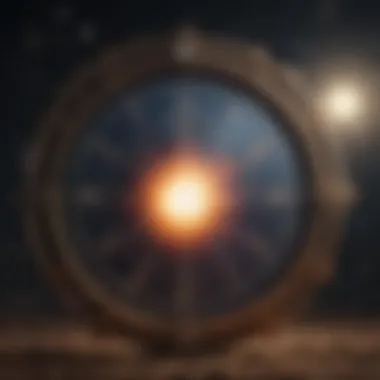Astrology's Insights: Navigating the Future


Intro
Astrology, a practice as old as civilization itself, serves as a fascinating lens to perceive our futures. It's a complex tapestry woven from the movements of celestial bodies, bonds found within our zodiac signs, and the patterns that emerge from these cosmic dances. For those on the quest for understanding, astrology can be more than a mystical art; it can be a tool of insight and foresight, guiding individuals through the labyrinth of possibilities that lie ahead.
As we delve into this intricate world, our aim is to illuminate how astrological principles not only reflect personal journeys but also resonate on a larger, societal level. In understanding our individual horoscopes, we gain a richer context of the potential paths we might traverse. This exploration also leads us into the realm of zodiac compatibility, where the interplay between individuals is influenced by their astrological origins.
Moreover, by keeping an eye on celestial events, we become attuned to the rhythms of the universe, learning how these moments can affect our lives. The insights we garner from astrology provide not just guidance but also a framework for personal development, societal interaction, and even lifestyle choices.
Ultimately, as we navigate through personal desires, relationships, and growth, astrology stands as a significant marker in showcasing the many avenues open to us. Let's embark on this journey together, unfurling the intricate layers of astrology and its potential to shed light on our futures.
Prologue to Astrology and Future Insights
Astrology has been a topic of fascination for centuries, acting as a bridge between the celestial influences of the universe and personal experiences on Earth. Recognizing the patterns and cycles in the stars often leads individuals to gain a deeper understanding of their life paths. In this article, we will navigate through the multifaceted realms of astrology, focusing on how it can potentially illuminate our futures.
Astrology is not merely about reading horoscopes or predicting the next romantic encounter. It serves as a vast tapestry that weaves together various elements—celestial bodies, the Zodiac signs, and the intricate web of relationships and energies present in our lives. As we delve into this intricate connection, it's essential to grasp key ideas around how astrology shapes our perceptions of future possibilities.
The significance of understanding astrology lies in its capacity to provide insights that resonate with our individual journeys. For instance, many find that knowing their astrological placements can empower them to make informed decisions, navigate crises, and recognize opportunities. While some may regard astrology as strictly entertaining or dismiss it as pseudoscience, there exists a community of practitioners who perceive it as a serious tool for self-exploration and foresight.
Defining Astrology
Astrology, at its core, is the study of the movements and relative positions of celestial bodies and their influence on human affairs. The term itself stems from the Greek words "astron" meaning 'star' and "logia" meaning 'study.' But more than just academic study, astrology merges mythology, history, and mathematics to craft a narrative that speaks to the human experience. In a way, one could say it's like a cosmic blueprint—mapping out individual potentials while hinting at future possibilities.
A crucial aspect of astrology is its reliance on birth charts or natal charts, which detail the positions of the sun, moon, and planets at the moment of one's birth. This chart serves as a snapshot of the celestial influences that shape personality traits, behaviors, and life events. It includes the twelve Zodiac signs, each symbolizing distinct characteristics, fogging the lens through which we perceive the world around us.
The Role of Astrology in Understanding the Future
Astrology provides a framework for understanding potential future outcomes through various methods of prediction. While it does not assert that specific events are preordained, it presents a narrative of possibilities based on current influences. Think of it like a weather forecast—there might be signs of rain, but how you choose to carry an umbrella is still up to you.
This predictive aspect can be incredibly beneficial when seeking clarity during uncertain times. By examining the celestial movements and their implications, individuals may feel better equipped to address personal dilemmas or societal changes. Different astrological techniques, such as transits or progressions, help astrologers interpret the ever-evolving cosmic landscape that impacts everyday life.
Moreover, recognizing the patterns offered by astrology can foster self-awareness. When people align their goals with identified cosmic cycles, they often find themselves more attuned to opportunities or challenges that arise.
In sum, astrology has the potential to illuminate varied aspects of our future, serving as a unique lens through which to view our paths. Whether as a tool for personal growth or a means to decipher forthcoming changes, astrology holds a space within the human experience—encouraging us to navigate the intricate dance of life guided by the stars.
"Astrology is a language. If you understand this language, the sky speaks to you.” – Dane Rudhyar
Key Concepts in Astrology
Astrology serves as a vast landscape filled with symbols and meanings, helping individuals interpret the cosmic clues that influence their lives. Understanding key concepts in astrology not only clarifies how celestial events relate to earthly experiences but also enables personal growth and deeper self-awareness. In this section, we will unpack three fundamental elements: celestial bodies, the Zodiac, and houses.
Celestial Bodies and Their Influence
Celestial bodies are the bedrock of astrological practice; they form the celestial tapestry that we analyze. Each planet, star, and asteroid possesses unique characteristics that represent various facets of human behavior and experiences. For instance, Jupiter embodies expansion and luck, while Saturn signifies restriction and discipline. By observing their placement in an individual's natal chart, astrologers can forecast potential opportunities or challenges.
- Sun: Represents the core self, vitality, and identity.
- Moon: Reflects emotions, instincts, and inner worlds.
- Mercury: Governs communication, intellect, and thought processes.
The influence of these celestial bodies is not merely theoretical; many individuals notice patterns in their lives that correspond with astrological predictions. Some may even state that they feel more energized during specific planetary transits or notice certain themes recurring in their lives based on lunar cycles. This observable influence fosters a belief in astrology's capacity to illuminate the future.
"The rhythm of the stars mirrors the rhythm of our lives, suggesting a deep-seated connection between the cosmos and our personal journeys."


The Zodiac: A Framework for Prediction
The Zodiac is a circular band of the heavens divided into twelve segments, each named after its corresponding constellation. These segments act as archetypal symbols that delineate various personality traits and life events. From Aries to Pisces, every sign carries distinct attributes that can shape an individual's character.
Understanding the Zodiac signs opens a rich dialogue regarding predictions. For example:
- Aries often denotes impulsiveness and leadership.
- Taurus is associated with stability and sensuality.
- Gemini signifies communication and adaptability.
Astrologers frequently use the placement of the sun, moon, and planets within these signs to interpret an individual’s life path. In predictive astrology, a challenging transit through a particular sign may denote a period for growth or introspection. Conversely, favorable aspects might signal times of opportunity and success. The richness of these interpretations allows practitioners to tailor their counsel to clients based on individual astrological configurations.
Houses: Mapping Personal Experiences
Houses represent different life sectors where celestial influences manifest. The natal chart is divided into twelve houses, each corresponding to various experiences such as relationships, career, and personal growth. Understanding houses helps astrologers pinpoint where attention is needed in someone's life.
Each house is ruled by the Zodiac sign that occupies it, thus merging the nature of the sign with the domain of life it represents. For instance:
- First House: The self, appearance, and identity.
- Seventh House: Partnerships and marriage.
- Tenth House: Career and public image.
Astrologers analyze the positions of celestial bodies within these houses to offer a layered understanding of how cosmic events might impact everyday life. A planet transiting through someone’s Tenth House, for example, could provoke changes in career or public perception. Likewise, this approach emphasizes that astrology is not just about predictions; it is about understanding the intricate interplay of cosmic energies within personal experiences.
Methods of Astrological Prediction
Astrology, at its core, seeks to decode the complexities of human experience through the celestial dance above. This section, dedicated to the methods of astrological prediction, underscores the significance of comprehending how we interpret these cosmic influences. Each method offers a unique lens, promising insights into personal and collective futures. The significance of these methods lies not just in their predictive capacity, but also in the understanding they foster about oneself and the world.
Natal Charts and Their Interpretations
At the heart of astrological prediction lies the natal chart, a map of where the planets were positioned at the exact moment of one's birth. This personalized chart serves as a blueprint for an individual's traits, strengths, and potential life events. When an astrologer interprets a natal chart, they analyze various components, such as the positions of the Sun, Moon, and ascendant. Each element contributes to a holistic understanding of personality, as well as potential challenges and opportunities.
An essential aspect of natal charts is the way they allow for self-reflection. Individuals can use their charts to recognize patterns in their behaviors or to identify times of significant change. This exploration can be a stepping stone to personal growth, turning seemingly mundane traits into profound insights.
Transits: Tracking Celestial Movements
Transits are a powerful method of prediction, focusing on how current planetary movements interact with one's natal chart. This dynamic process highlights moments of change and opportunity, reflecting how ongoing cosmic influences can impact life’s trajectory in real time. For instance, while Jupiter might bring good fortune when it transits over one's Sun, Saturn could indicate a period of increased responsibility.
By tracking transits, astrologers can guide individuals to recognize favorable times for taking risks or making important decisions. This foresight can enhance personal agency, encouraging individuals to align their actions with the rhythms of the universe rather than fighting against them.
Synastry: Relationship Forecasting
Synastry delves into the comparative analysis of two or more natal charts, creating a tapestry of interaction between individuals. This method is particularly valuable in relationship forecasting, offering insights into compatibility, challenges, and growth opportunities. By examining the aspects between partners’ planets, astrologers can identify how individuals will likely relate to one another, revealing deeper emotional or even karmic connections.
For example, a strong Venus-Mars aspect can signify a passionate connection, while significant Saturn aspects might ask individuals to navigate responsibilities together. This nuanced understanding can illuminate the intricacies of relationships, shedding light on paths for healthier interactions and personal growth within partnerships.
Progressions: A Time-Based Approach
Progressions involve a symbolic method of tracking personal development over time. Unlike transits that focus on external planetary movements, progressions move the natal chart forward, reflecting internal growth and shifts. A common technique in progressions is to use a day-for-a-year system, where each day after birth represents a year of life.
Astrologers interpret progressed positions to discern changes in personality traits or life themes. For instance, if a person’s progressed Moon enters a new sign, it may signal a phase where emotional needs shift significantly. This methodology emphasizes the impermanence of life, helping individuals recognize the cyclical nature of growth and transformation.
"Astrology provides a lens through which we can understand ourselves better and make informed decisions based on celestial influences."
In essence, exploring these methods of astrological prediction offers diverse tools for navigation in life. Each technique presents distinct avenues for understanding the self, relationships, and the ever-unfolding narrative of life’s journey.


Interpreting Astrological Predictions
Interpreting astrological predictions is a crucial aspect that connects the dots between celestial influences and personal reality. It requires a nuanced understanding and a skilled approach. Not everyone who reads a horoscope can pick up on the fine, intricate threads of meaning woven into the fabric of astrological insight. This section will delve into how such interpretations can be beneficial, what one needs to consider, and the particular facets that make this practice both challenging and rewarding.
Intuition and Insight in Astrology
When one engages with astrology, there's often a degree of intuition involved. Intuition here is not merely a feeling but a deeper connection to the energies at play. Experienced astrologers often tap into their instincts to gain insight beyond the surface-level readings. This intuition comes from years of practice plus an intrinsic understanding of how various elements interact.
- Personal Vibration: Each person resonates with different aspects of their natal chart. For instance, someone with a strong Scorpio influence may read transits with a focus on transformation and emotional depth. This makes them more attuned to specific predictions related to personal growth or crises.
- Patterns and Narratives: Astrology often reveals repeating patterns in individuals' lives. By identifying these, practitioners can see larger themes at work. The cycles of the Moon, for instance, can connect to one's emotional landscape in ways that astrological forecasts can guide.
One should not overlook the ethereal nature of intuition in this discipline. It doesn’t follow strict logic. Rather, it ebbs and flows similar to the tides, and allowing space for this intuitive understanding often leads to richer interpretations.
Common Misinterpretations of Astrological Data
Astrology is often shrouded in misunderstandings, especially in today's digital age. It's essential to sift through these common misinterpretations to foster a clearer grasp of astrological predictions.
- Oversimplification: One of the biggest pitfalls is reducing complex configurations to mere Sun signs. While your sun sign plays a pivotal role, each chart contains multiple layers, including the moon sign and rising sign. It can be like trying to understand a nuanced novel by only reading the title.
- Confirmation Bias: People tend to remember the hits and forget the misses. A favorable astrological prediction would be recalled and possibly celebrated, whereas a negative forecast might get brushed aside. This can create a skewed understanding of how astrology impacts one’s life.
- Ignoring Context: The context in which an astrological prediction is made is fundamental. A career forecast might not resonate if a person is experiencing significant personal changes. A reader should consider their unique circumstances before accepting blanket predictions too readily.
Astrology invites a dialogue—between the stars and ourselves. Yet, clarity in interpretations requires diligence and mindfulness.
Astrology is not a rigid science, but rather a dynamic system that can inform and illuminate paths forward. By balancing intuition with a critical eye towards common misinterpretations, astrologers can unlock the profound potential of their readings, guiding themselves and others toward greater understanding and insight.
Astrology's Relevance in Modern Society
Astrology has transcended its esoteric roots to become a part of contemporary culture. With nature intertwined in our lives, many people turn to astrology for guidance. It is not merely a weekend pastime; it has grown into a tool for self-discovery, personal growth, and understanding societal trends. The importance of astrology today intertwines deeply with the human quest for meaning and purpose in an increasingly complex world.
Astrology as a Tool for Personal Growth
Many individuals are now viewing astrology as a mirror reflecting their inner selves. The insights gained from natal charts or transiting planets can lead to moments of enlightenment. Here are some key elements:
- Self-Awareness: By understanding one’s astrological placements, individuals may recognize patterns in their behavior, which helps in making informed choices. Recognizing strengths and weaknesses creates a more balanced approach to life.
- Emotional Intelligence: Astrology encourages emotional exploration. Let's think about the Moon's position in a chart. It can reveal inner feelings and responses to various situations. Knowing where emotions stem from can significantly impact personal relationships and mental well-being.
- Goal Setting: Solar returns and transits can act as a framework for setting future objectives. Evaluating astrological influences can result in setting intentions aligned with one's personal timeline. Whether it’s career, health, or relationships, astrology can guide individuals through potential obstacles.
Astrology functions not just as a prophecy but as a roadmap. It provides opportunities for intention and growth, nudging individuals towards a clearer and more purposeful path.
The Cultural Shift Towards Astrology
Over the past decade, we have witnessed a fascinating cultural shift where astrology has flown from niche communities to mainstream acceptance. Here are some contributing factors:
- Digital Age: Social media platforms have accelerated the spread of astrological content. TikTok, Instagram, and even Facebook are bursting at the seams with astrological memes, insights, and discussions. This online presence facilitates community interaction, making astrology more accessible.
- Mental Health Conversations: In a culture keen on addressing mental health, astrology offers a framework for individuals seeking to discuss their feelings or challenges. People are increasingly drawn to astrology to help articulate their experiences and receive validation, especially during uncertain times.
- Customizable Experiences: Unlike traditional therapies that often follow a set formula, astrology provides a tailored experience. Individual charts differ drastically, creating a unique lens through which each person can understand themselves.
"Astrology’s increasing relevance highlights a collective yearning for connection—to self and the universe."
Moreover, as more individuals identify themselves with astrological signs, the topic gains a sense of belonging and community. This cultural embrace encourages discussions about authenticity and personal journeys, transforming astrology into a valuable tool for social connectivity.
Overall, astrology’s relevance in modern society reflects a changing landscape where individuals seek greater understanding of themselves and their place in the world. It provides not only personal insights but also a communal experience that resonates with many.
Critiques and Limitations of Astrology
When it comes to the realm of astrology, there’s a divide that’s as ancient as the stars themselves—supporters and skeptics. Acknowledging the critiques and limitations of astrology is crucial for a well-rounded exploration of its potential benefits. This section aims to shed light on the skepticism that often surrounds astrological claims and how cognitive biases can affect perceptions concerning this esoteric practice.
Skepticism Around Astrological Claims


Skepticism towards astrology frequently stems from a scientific approach that favors empirical evidence over metaphysical speculation. Critics often argue that claims made by astrologers are too generalized, lacking specificity and measurable outcomes. They suggest that the predictions can be so vague that they can apply to anyone, thereby making them seemingly accurate without any real substance.
For instance, when an astrologer says, "You might face some challenges this week," it’s not hard to find something daunting in everyday life to fit that description. Moreover, there’s a concern that astrology does not take into account the complexities of human experience and free will. Critics argue that to rely solely on celestial movements to shape one’s destiny is to ignore personal agency.
"Astrology often serves as a mirror reflecting personal beliefs rather than an objective tool for prediction."
Despite this, many astrologers contend that astrology offers insights and frameworks that augment, rather than dictate, a person's choices. By providing perspectives on influences, astrology can potentially guide individuals when making decisions, even if the predictions are not always spot on.
The Impact of Confirmation Bias
A key play in the critiques of astrology is the phenomenon of confirmation bias, a cognitive bias that compels individuals to favor information that confirms their preexisting beliefs. This is particularly relevant in astrological readings where individuals often remember the hits and conveniently forget the misses. When a prediction appears accurate, it reinforces the belief in astrology as a credible tool. Conversely, when a prediction falls flat, it gets easily brushed aside or rationalized.
For example, if someone reads in their horoscope that they will have a great day at work, and then they indeed perform well, they might see this as validation of astrological accuracy. However, if their day ends up fraught with difficulties, they might simply dismiss the reading as not reflecting their current experiences.
This selective memory can lead to an inflated sense of the effectiveness of astrology, obscuring its limitations. Recognizing this bias is essential for anyone looking to seriously engage with astrological insights. It’s not just about the stars; it’s about understanding how our minds can play tricks that influence our choices and perceptions.
In closing, while astrology continues to spark interest and offer guidance for many, it’s also important to approach it with an informed mind. Being aware of the critiques, limitations, and cognitive biases at play will foster a richer understanding of how astrology fits into the broader context of human experience.
Navigating the Future Through Astrology
Astrology serves as a compass providing direction in the oft-turbulent sea of life's uncertainties. It offers a lens through which individuals can discern patterns and potential outcomes based on the positions of celestial bodies at specific times. In this section, we will delve into the importance of utilizing astrology to navigate the future, exploring its practical applications and the guiding philosophy it embodies.
Practical Applications of Astrological Insights
Astrological insights are not mere curiosities; rather, they have practical relevance in our daily lives. For many, astrology can transform the way they approach big decisions and everyday choices. Here are a few ways you can leverage astrological insight:
- Personal Timing: Understanding your personal transits can illuminate the best times for making significant life changes—be it starting a new job, undertaking a relationship, or making financial investments. Timing is crucial in life, and knowing when the planets favor action can make a world of difference.
- Career Development: Astrology can guide individuals in career choices that align with their inherent strengths and weaknesses. Analyzing someone’s natal chart can reveal potential vocational paths that resonate with their personal attributes.
- Relationship Navigation: Whether it's a budding romance or a long-standing partnership, astrology helps individuals understand compatibility and communication styles, allowing them to navigate their relationships more skillfully.
- Health and Wellness: Certain astrological signs correspond to bodily tendencies. Insight into these correlations can guide individuals to adopt lifestyle changes that cater to their health needs, enhancing their quality of life.
By applying astrological concepts to these facets of life, one can gain a nuanced understanding of both immediate and long-term outcomes. This foresight can be essential for cultivating a more fulfilling existence.
Astrology as a Guiding Philosophy
Astrology invites adherents to adopt a perspective that weaves cosmic events into the fabric of daily life. Rather than a tool for predicting fixed fates, astrology encourages individuals to embrace it as a guiding philosophy. Here’s why:
- Interconnectedness: Astrology teaches that everything, from personal choices to global events, impacts one another. Recognizing this interconnectedness fosters a deeper sense of responsibility in our actions, as we begin to see ourselves as part of a larger cosmic narrative.
- Adaptability: Life’s unpredictability necessitates flexibility. Astrology doesn’t just offer insights into what might occur; it equips individuals with the wisdom to respond to circumstances with resilience and adaptability, interpreting challenges as opportunities rather than impediments.
- Personal Growth: Engaging with astrology can lead to profound self-awareness. By understanding astrological influences, individuals can identify personal patterns and recurring themes in their lives, catalyzing personal growth.
- Empowerment: Ultimately, astrology can serve as a source of empowerment. By obtaining insights into potential futures, people can make informed choices, shaping their paths rather than merely reacting to circumstances.
"Astrology is not a belief system, but a natural science that can guide us through the most tumultuous parts of our lives."
As we navigate through the complexities of existence, astrology can illuminate the path ahead, revealing both the potentials and pitfalls that lie in our journey. By marrying practical applications with a philosophical outlook, astrology offers a rich tapestry of understanding, enabling individuals to steer their own futures with intention and awareness.
The End: The Intersection of Astrology and Future Possibility
Astrology, steeped in history and rich with symbolism, serves as both a mirror to self-discovery and a map to navigate the future. In this article, we have explored how astrological principles are not merely whimsical notions but frameworks through which individuals can grasp their life’s potential. The importance of astrology extends beyond entertainment; it can be an invaluable tool for personal growth, relationship dynamics, and even societal trends.
Astrology demands a careful synthesis of celestial insights and personal interpretation. Here are some key elements to consider:
- Personal Reflection: Astrological charts encourage individuals to reflect deeply on their own behaviors, motivations, and desires. This self-awareness can be transformative, offering clarity on life’s path.
- Broader Context: Understanding astrological transits provides a lens to view societal movements, creating a more profound comprehension of collective phenomena, such as changes in political tides or cultural shifts. The interconnection between personal and universal experiences can be revealing.
- Guiding Philosophy: Astrology can function as a bedrock for philosophical contemplations. The patterns and cycles it highlights push individuals to contemplate fate, free will, and how these concepts influence one’s life trajectory.
Astrology is not infallible, nor can it claim omniscience, yet it provides a compelling narrative that enriches our understanding of life's complexities. This becomes particularly resonant in a rapidly changing world where uncertainties abound. The beauty of navigating through these uncertainties lies in the insights astrology offers, presenting future possibilities in a framework that respects individual agency.
"Astrology is like a road map; while it can show the potential journeys, it is ultimately up to the traveler to choose their path."
The Future Landscape of Astrology
As we look to the future, the trajectory of astrology seems poised for evolution. Factors influencing this shift include technological advancements, increased accessibility to astrological resources, and a growing openness to esoteric practices among the masses.
- Technological Integration: With the rise of apps and websites, astrology has transcended traditional publications, bringing personalized horoscopes and insights right on users' mobile devices. This ease of access means that more people are becoming engaged with astrology—whether for personal guidance or casual interest.
- Educational Efforts: Online courses and communities, like those on Reddit or various Facebook groups, provide platforms for sharing knowledge and experiences. Aspiring astrologers can access resources from seasoned practitioners, enabling a more informed approach to astrological interpretations.
- Hybrid Practices: There’s an upward trend in blending astrology with other healing practices—such as tarot reading and meditation—creating a multifaceted approach to personal growth. This hybridization makes astrology more relatable and applicable to a broader audience, integrating ancient wisdom with modern insights.
- Cultural Shifts: The growing acceptance of astrology in mainstream culture suggests a potential field for ongoing research and exploration. As societal interest continues to rise, astrology may become a staple in discussions surrounding mental health and introspection.







